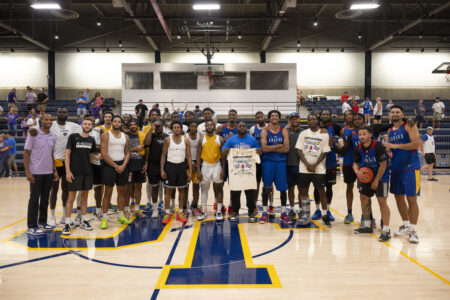New Mexico State’s ‘Chili’ plays to represent South Africa

New Mexico State coach Marvin Menzies, right, hugs center Tshilidzi Nephawe toward the end of the second half of the Aggies’ victory over Cal State-Bakersfield in the semifinals of the Western Athletic Conference tournament on Friday in Las Vegas. Nephawe is one of four seniors Menzies will count on when the Aggies open the NCAA Tournament against Kansas on Friday in Omaha, Nebraska.
Omaha ? There’s no dog, powder or dip involved, only a 17-year-old South African boy trying to make his name easier for people to pronounce.
When New Mexico State forward Tshilidzi Nephawe (pronounced Cha-lee-zee Nah-pow-way) first started playing basketball back in his hometown of Johannesburg, South Africa, the other athletes he played with had a difficult time pronouncing his name.
“Venda, my language, is the hardest language to pronounce in South Africa,” Nephawe said in front of his locker at CenturyLink Center, where his 15th-seeded Aggies were preparing to face No. 2 seed Kansas at 11:15 a.m. Friday. “Even some South African people from other cultures really struggle pronouncing my name. When I started playing basketball, I started playing with people from other cultures and they would struggle, saying “Chil-ee, Chil-ih, and I said, ‘You know, my name is Chili.'”
From that day on, Nephawe has been known to those closest to him as “Chili.” The name and the frame — 6-foot-10, 268 pounds, chiseled, long and athletic — don’t exactly match, but the NMSU forward, one of nine foreign-born players on the Aggies’ roster, has embraced it whole-heartedly.
“Just call him Chili,” said NMSU guard D.K. Eldridge. “He gets mad if you don’t say his nickname.”
And mad is not something anyone wants to make Nephawe, who did not learn English until he arrived in the United States and did not know a thing about the NCAA Tournament until his freshman season at NMSU.
Despite his intensely physical play and rocked-up appearance, NMSU coach Marvin Menzies describes Nephawe as “one of the nicest human beings you could ever know.”
The son of a government office-worker mother and tailor father, and lone boy in a family of five children, Nephawe has a great deal of pride in his homeland. That pride, however, is not just your typical, patriotic, wave-the-flag-and-stand-for-the-anthem kind of pride. It’s rooted in events and progress that took place even before Nephawe was born.
“Every time I put that NMSU jersey on and go play, I try to represent my country,” Nephawe said. “It means a lot because we came from far, when it comes to race and everything. I’m just glad the country is where it is now. Even though it only changed in 1994 (with the end of Apartheid), I feel like everyone is equal now. It’s like it is here.”







